人教版九年级英语第十单元PPT课件
合集下载
英语人教版九年级全册unit10ppt

3.When Maria met Paul’s mom,she was supposed to_____s_h_a_k_e_h_a_n_ds__in_s_te_a_d__
4.Maria should ask what she is supposed to__w__e_ar______ a party next time.
2c. Pairwork
A: How was the dinner at Paul's house last night?
B: Well, it was OK, but I made some mistakes. I was supposed to arrive at 7:00, but I arrive at 8:00.
This couple have already arrived in Beijing
2. greet =to welcome or say “hello” 动词 “问候,打招呼”如:
• He greeted her by saying “good morning” 他向她打招呼说 “早上好”。
• She greeted me with a friendly smile. 她向我微笑致意。 • A beautiful view greeted us. 美丽的景色呈现在我们面前。
Unit 10 You’re supposed to shake hands.
Section A
New Words and phrases
shake hands 握手 custom n. 风俗;习俗 bow v.鞠躬 kiss v.&n.亲吻;接吻 greet v.和……打招呼;迎接
be supposed to do 应该做 be expected to do 应该做
人教英语九年级全一册Unit10SectionA1a2c课件
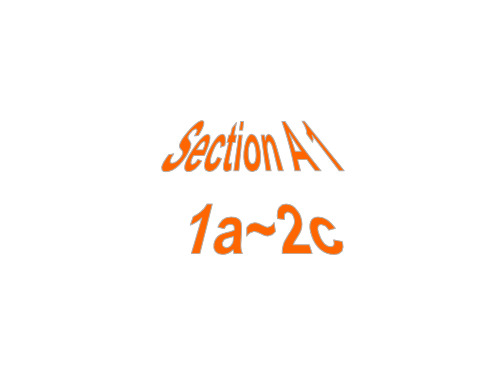
…
Strategy 3: Listening for the key words!
After listening Listen and repeat
Strategy 4: Focusing on the target language!
After listening
2a Before listening
a. bow b. shake hands
3. _____ Japan
c. kiss
4. _____ Mexico
5. _____ Korea
Strategy 2: Guessing before listening!
1b While listening
Listen and check your answers in 1a.
2a While listening Maria is an exchange student. Last night she had dinner at an American friend’s house. Listen and check (√) the mistakes Maria make.
People are supposed to dress more casually, such as a T-shirt or jeans. 3.Why are other people looking at the girl?
Because she wears a formal dress.
Strategy 5: Observing the picture to guess the background of the conversation!
Ⅱ. Culture and emotional goals: To learn greeting customs in different countries. To learn cultural differences between different countries . To learn to respect the people with different cultures.
Strategy 3: Listening for the key words!
After listening Listen and repeat
Strategy 4: Focusing on the target language!
After listening
2a Before listening
a. bow b. shake hands
3. _____ Japan
c. kiss
4. _____ Mexico
5. _____ Korea
Strategy 2: Guessing before listening!
1b While listening
Listen and check your answers in 1a.
2a While listening Maria is an exchange student. Last night she had dinner at an American friend’s house. Listen and check (√) the mistakes Maria make.
People are supposed to dress more casually, such as a T-shirt or jeans. 3.Why are other people looking at the girl?
Because she wears a formal dress.
Strategy 5: Observing the picture to guess the background of the conversation!
Ⅱ. Culture and emotional goals: To learn greeting customs in different countries. To learn cultural differences between different countries . To learn to respect the people with different cultures.
人教版九年级英语上册课件:Unit 10 (共21张PPT)
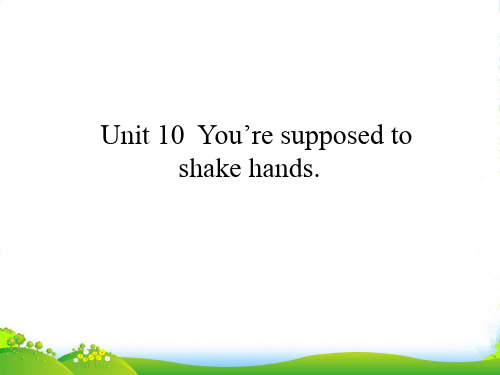
3. (重庆南开名师讲解)Learning what you are supposed to do and aren’t supposed to do in social situations may be difficult, but it is worth the trouble if you want to understand another culture. 在社交场合学会你应该做什 么,不应该做什么也许很难,但是如果你想要了解另一种 文化,这些困难是值得的。
(2)辨析besides, except, but与except for ①besides 意为“除……之外还有……”,包括在内。如: There are another two boys here besides Tom and me. 这里除了汤姆和我,还有另外的两个男孩。 ②but与except 同义,“除……之外”,不包括在内。如 果句中有no one, nobody, nothing, all, everyone, everything等, 多用but;except后接副词、介词短语时, 不能用but来代替。 如:
(1)worth“值……的;有……的价值的”,常用的句式有: 主语+be+worth+v-ing+其他。如: He isn’t worth getting angry with. 犯不上跟他生气。 注意:①动名词之后的介词不可省去。②worth后面的动 名词一般用主动形式表示被动意义,而不能直接用被动形 式。如: The film isn’t worth seeing. 这个电影不值一看。 It + be + worth + v-ing + 其他 如: It isn’t worth repairing the bike. 这辆自行车不值得修理 了。
人教版九年级英语课件Unit10SectionA1a2d共18张
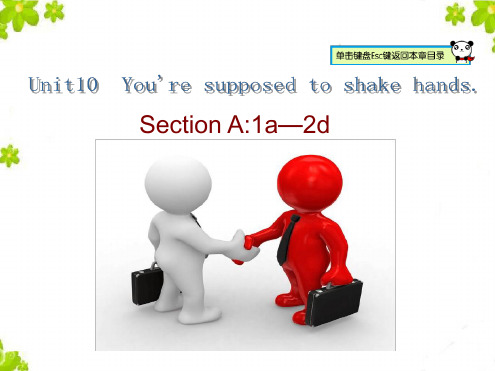
1.知识目标 1)重点词汇: ? custom (n.)
bow (v. n.)
greet (v.)
Kiss (v. n.)
2)重点句子: 1.What are you supposed to do when you meet someone
for the first time? 2.You are supposed to shake hands./ You are not supposed to kiss.
Section A:ห้องสมุดไป่ตู้a—2d
?What do people do when they meet for the first time in Brazil?
What do people do when they meet for the first time in the USA?
French people look at each other face to face when they meet.
4.A: What are people in Korea supposed to do when they meet for the first time?
B: They're supposed to bow. How about in the United States? A: In the United States, they're expected to shake hands. 5. I met a Japanese boy called Sato, and as soon as I held out my hand, he bowed.
3.---How was the dinner at Paul's house last night? --- Well, it was OK, but I made some mistakes. I was supposed to arrive at 7:00, but I arrived at 8:00.
人教版九年级英语课件:Unit10(共35张PPT)
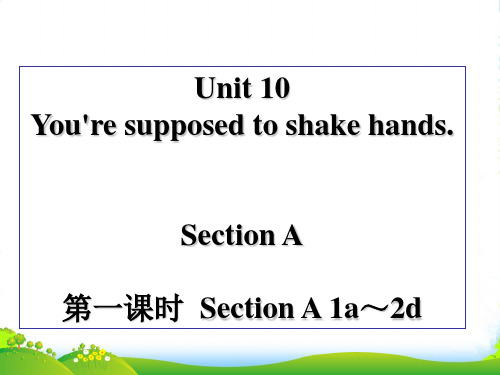
课堂同步
一、阅读课本第74页2d,回答问题。 1.What is the funny thing happened at the party? J_o_h_n_m__et__a _J_a_p_an_e_s_e__b_o_y,_a_n_d_a_s_s_o_o_n__a_s _h_e_h_e_l_d_o_u_t_ h_i_s_h_a_n_d_,t_h_e_b_o_y__b_o_w_e_d_._______________________ 2.How are Japanese people expected to greet each
A. invented B. discovered
C. found
D. found out
课堂同步
阅读课本第75页3a,判断正误。正确的写“T”,错 误的写“F”。
(T )1.It is important for people in Colombia to spend time with family and friends.
friends in our everyday lives. 我们特别珍惜平日生活中和家人、朋友在一起的时光。 spend time with sb. 与某人共度时光 如:He will not come. He spends all his free time with his
family. 他不会来。他所有的空闲时间都和他的家人在一起。
知识拓展
(1)若表示“在……上花费(时间、金钱等)”,常用句 型spend some money / some time on sth.,介词on后面 接名词或代词。 如:Kitty spends two hours on her homework every day. 凯蒂每天花两个小时做家庭作业。
人教版九年级英语课件:Unit 10 单元话题阅读与写作课件(共13张PPT)
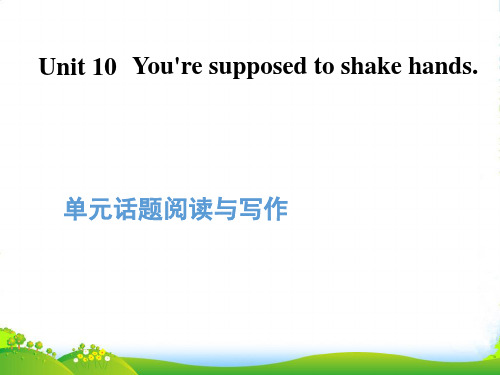
_______________________________________________________
I hope you'll have a wonderful time in our country.
Yours,
Wang Ming
点评:1.本文结构清晰,各要点内容充实; 2.运用First...Then...After that...Second...Also
_So the manners in China are very different from those in your coun_t_r_y._(_高__分__句__型__1_)__L_e_t__m__e__te_l_l _y_o_u__s_o_m__e_th_i_n_g__a_b_o_u_t__th_e__ _customs and manners in our country.
at a dinner or a party. ◆Don't make or answer a call while driving.
For subway passengers ◆You are supposed to wait in line while buying tickets and
getting on the subway. ◆You're not allowed to eat,drink or smoke in the subway. ◆You can‘t take pets in the subway. As we all know, animals
谢谢观赏
You made my day!
我们,还在路上……
●Keep thesubway 4._____________ ●Offer your seat to
I hope you'll have a wonderful time in our country.
Yours,
Wang Ming
点评:1.本文结构清晰,各要点内容充实; 2.运用First...Then...After that...Second...Also
_So the manners in China are very different from those in your coun_t_r_y._(_高__分__句__型__1_)__L_e_t__m__e__te_l_l _y_o_u__s_o_m__e_th_i_n_g__a_b_o_u_t__th_e__ _customs and manners in our country.
at a dinner or a party. ◆Don't make or answer a call while driving.
For subway passengers ◆You are supposed to wait in line while buying tickets and
getting on the subway. ◆You're not allowed to eat,drink or smoke in the subway. ◆You can‘t take pets in the subway. As we all know, animals
谢谢观赏
You made my day!
我们,还在路上……
●Keep thesubway 4._____________ ●Offer your seat to
人教版九年级英语第十单元课件

Essay Writing Exercises: This section provides a series of essay writing exercises that gradually increase in difficulty, helping students improve their essay writing skills.
Writing Assignments
Students are required to complete several writing assignments, including essays, creative stories, and reviews.
03
04
05
Textual elaboration
Comprehension during listening
Guide students to understand the main idea and important information of the listening material, distinguish the main voice and background noise, and improve their ability to extract information.
The influence of culture on language
how culture affects language development, language use, and language meaning, with examples of cultural differences in language use.
Complex sentence structure
人教版九年级英语上册第十单元全部课件(优质)

We are(not) supposed/expected to … It is important / polite /impolite to
Grammar Focus
be supposed to… be expected to … be important to…
4a
1.In Switzerland, it _is_i_m__p_o_r_ta_n_t__to___ call first before you visit a friend’s house.
2. When you go abroad, it _is_i_m__p_o_r_ta_n_t__to_ bring your passport.
3. After class, students _a_r_e_s_u_p_p_o_s_e_d__to_ clean the chalk off the blackboard.
5. In many eastern European countries, you _a_r_e_s_u_p_p_o_s_e_d__to_ take off your gloves before shaking hands.
6. As students, we _a_r_e_s_u_p_p_o_s_e_d_t_o_ follow the rules at school.
2. In Maria’s country, when you’re invited for 7:00, you’re expected to _c_o_m__e_l_a_te_r__.
3. When Maria met Paul’s mom, she was supposed to _s_h_a_k_e__h_a_n_d_s.
Grammar Focus
be supposed to… be expected to … be important to…
4a
1.In Switzerland, it _is_i_m__p_o_r_ta_n_t__to___ call first before you visit a friend’s house.
2. When you go abroad, it _is_i_m__p_o_r_ta_n_t__to_ bring your passport.
3. After class, students _a_r_e_s_u_p_p_o_s_e_d__to_ clean the chalk off the blackboard.
5. In many eastern European countries, you _a_r_e_s_u_p_p_o_s_e_d__to_ take off your gloves before shaking hands.
6. As students, we _a_r_e_s_u_p_p_o_s_e_d_t_o_ follow the rules at school.
2. In Maria’s country, when you’re invited for 7:00, you’re expected to _c_o_m__e_l_a_te_r__.
3. When Maria met Paul’s mom, she was supposed to _s_h_a_k_e__h_a_n_d_s.
- 1、下载文档前请自行甄别文档内容的完整性,平台不提供额外的编辑、内容补充、找答案等附加服务。
- 2、"仅部分预览"的文档,不可在线预览部分如存在完整性等问题,可反馈申请退款(可完整预览的文档不适用该条件!)。
- 3、如文档侵犯您的权益,请联系客服反馈,我们会尽快为您处理(人工客服工作时间:9:00-18:30)。
过去的过去.
过去完成时态的用法:
1、表示过去的过去,通常由when或by引导的 短语或者从句做时间状语或时间状语从句 by the time 到……时候为止,指从过去某一 点到,从句所示的时间为止,这一时间段。 when当……时候,指过去的某一时间点。从 句用一般现在时,主句为过去完成时。
My little brother went to bed
first When I got to the station, the train had already left.
first After he had finished his homework, he went to bed.
小组讨论,将过去完成时态思维导图补充完整
had+PP. had not+PP.
2、常用在宾语从句中 ① He told me he had already
finished his homework ② I realized he had fooled me
again
3、体现在上下文中 I didn’t go to the movies yesterday because I had seen it twice
She ___________ the first runner-up prize in a beauty contest before she __________an actress.
A. have won, became B. had won,
如何区分一般过去时,现在完成时,过去完成时态
1.We started to learn English 5 years ago. 一般过去时表示在过去某时发生的动作或存在 的状态。
二、构成: 肯定句:主语+had+过去分词 否定句:主语+had not+过去分词 疑问句:had+主语+过去分词…?
上个月之前,他已经完成了工作。 He had finished the work by last month?
He had not finished the work by last month?
by the time (= when) 到……时
我们赶到学校时,已经 上课了。
_B_y__th__e_t_im__e__ we got to school, the class _h_a_d_ already _b_e_g__u_n_. _
当我到达火车站时,火车 已经开走了。
By the time I g__o_t to the station, the train _h_a_d_ already _l_e_ft__ .
2 能力目标:学会询问和谈论过去的经历。
3 情感目标:引导学生关注自己身边的人和 事物。
预习检查
想想我们以前学过的时态都有哪些,尝试着在 时间轴上画一下
精讲点拨 过去完成时
1. 构成: had +V-p.p
2. 过去完成时态的含义:
主要是表示在过去某个时间,或是动作 之前已经发生或完成的动作.也就是:
8:00pm
9:00pm
now
I got home
By the time I got home, my little brother had gone to bed.
The teacher came into
the classroom
8:00am
8:30 I got to school
now
By the time I got to school, the teacher had come into the classroom.
Had he finished the work by last month?
随堂达标
Mary_____________ some Chinese before she came to China.
A. learned B. has learned C. learnt D. had learned
By the time we got there,the bus had already gone.
We got there at 7:00 The bus left at 6:59
When I got to the check-out, I realized I had left my purse at home.
过去完成时表示在过去某个时间或动 作之前已经发生或完成了的动作或存在的
状态, 即“过去的过去( past-in-the-
past )”。
past in the past past
now
过去完成时
由“过去的过去”来判定。
过去完成时表示“过去的过去”,先发生的动作用过去完 成时,后发生的动作用一般过去时。
He told me he ___h_a_d_h_a_d_______ ( have ) a meeting two weeks before.
2. I _ha_d__fi_ni_s_he_d________ ( finish ) my homework when my father got home yesterday. Ifini_sh_e_d_________ ( finish ) my homework at 10 last night.
5 years ago
now
2. We have learned English for 5 years.
现在完成时表示的动作发生在 过去,但侧重对
现在产生的结果或造成的影响,与现在有关。
其结构为:“助动词 have(has)+过去分词”
5 years ago have learned now
过去完成时的概念与结构特点:
Unit 10
By the time I got outside, the bus had already left.
1语言目标
A 熟练掌握和运用过去完成时态me she got up, her brother had already gone inti the bathroom.
had+ 主语+PP.
1 过去的过去 2 常用在宾从中 3 体现在上下文
when,by
综合时态填空:
1.meHeeti_n_g__nw_e_ilx_l t_h_aw_ve_ee_k_.___( have ) a
He _____h_ad__________ ( have ) a meeting two weeks ago.
过去完成时态的用法:
1、表示过去的过去,通常由when或by引导的 短语或者从句做时间状语或时间状语从句 by the time 到……时候为止,指从过去某一 点到,从句所示的时间为止,这一时间段。 when当……时候,指过去的某一时间点。从 句用一般现在时,主句为过去完成时。
My little brother went to bed
first When I got to the station, the train had already left.
first After he had finished his homework, he went to bed.
小组讨论,将过去完成时态思维导图补充完整
had+PP. had not+PP.
2、常用在宾语从句中 ① He told me he had already
finished his homework ② I realized he had fooled me
again
3、体现在上下文中 I didn’t go to the movies yesterday because I had seen it twice
She ___________ the first runner-up prize in a beauty contest before she __________an actress.
A. have won, became B. had won,
如何区分一般过去时,现在完成时,过去完成时态
1.We started to learn English 5 years ago. 一般过去时表示在过去某时发生的动作或存在 的状态。
二、构成: 肯定句:主语+had+过去分词 否定句:主语+had not+过去分词 疑问句:had+主语+过去分词…?
上个月之前,他已经完成了工作。 He had finished the work by last month?
He had not finished the work by last month?
by the time (= when) 到……时
我们赶到学校时,已经 上课了。
_B_y__th__e_t_im__e__ we got to school, the class _h_a_d_ already _b_e_g__u_n_. _
当我到达火车站时,火车 已经开走了。
By the time I g__o_t to the station, the train _h_a_d_ already _l_e_ft__ .
2 能力目标:学会询问和谈论过去的经历。
3 情感目标:引导学生关注自己身边的人和 事物。
预习检查
想想我们以前学过的时态都有哪些,尝试着在 时间轴上画一下
精讲点拨 过去完成时
1. 构成: had +V-p.p
2. 过去完成时态的含义:
主要是表示在过去某个时间,或是动作 之前已经发生或完成的动作.也就是:
8:00pm
9:00pm
now
I got home
By the time I got home, my little brother had gone to bed.
The teacher came into
the classroom
8:00am
8:30 I got to school
now
By the time I got to school, the teacher had come into the classroom.
Had he finished the work by last month?
随堂达标
Mary_____________ some Chinese before she came to China.
A. learned B. has learned C. learnt D. had learned
By the time we got there,the bus had already gone.
We got there at 7:00 The bus left at 6:59
When I got to the check-out, I realized I had left my purse at home.
过去完成时表示在过去某个时间或动 作之前已经发生或完成了的动作或存在的
状态, 即“过去的过去( past-in-the-
past )”。
past in the past past
now
过去完成时
由“过去的过去”来判定。
过去完成时表示“过去的过去”,先发生的动作用过去完 成时,后发生的动作用一般过去时。
He told me he ___h_a_d_h_a_d_______ ( have ) a meeting two weeks before.
2. I _ha_d__fi_ni_s_he_d________ ( finish ) my homework when my father got home yesterday. Ifini_sh_e_d_________ ( finish ) my homework at 10 last night.
5 years ago
now
2. We have learned English for 5 years.
现在完成时表示的动作发生在 过去,但侧重对
现在产生的结果或造成的影响,与现在有关。
其结构为:“助动词 have(has)+过去分词”
5 years ago have learned now
过去完成时的概念与结构特点:
Unit 10
By the time I got outside, the bus had already left.
1语言目标
A 熟练掌握和运用过去完成时态me she got up, her brother had already gone inti the bathroom.
had+ 主语+PP.
1 过去的过去 2 常用在宾从中 3 体现在上下文
when,by
综合时态填空:
1.meHeeti_n_g__nw_e_ilx_l t_h_aw_ve_ee_k_.___( have ) a
He _____h_ad__________ ( have ) a meeting two weeks ago.
